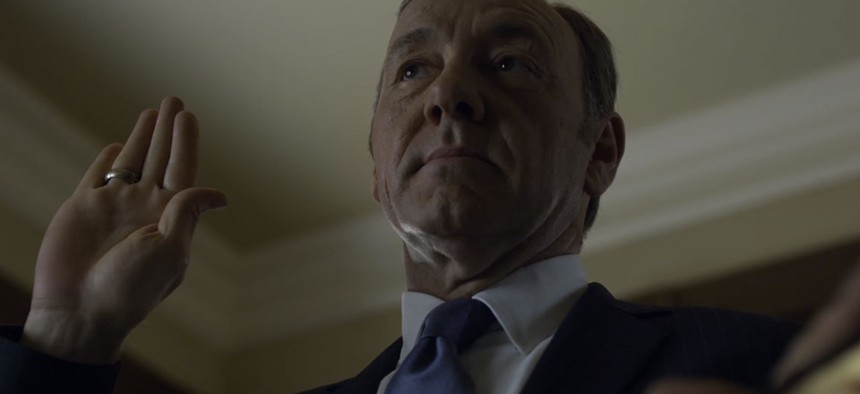
Netflix via YouTube
'House of Cards' and a Brief History of Ruthless Pragmatism
Frank Underwood may be fictional but his philosophy isn’t—just ask Barack Obama or any master of political gamesmanship.
The greatest compliment Frank Underwood bestows upon anyone in season two of House of Cards is when he calls his political protege, Rep. Jacqueline Sharp, a "ruthless pragmatist."
Frank (Kevin Spacey), has done a lot to deserve the title himself (and here I should issue a spoiler alert for anyone who hasn't finished the second season). He sleeps with Slugline journalist Zoe Barnes when it's politically expedient, and kills her when it isn't. He builds up Rep. Peter Russo when it's in his interest and gets rid of him when that's what suits him. Even his marriage to his wife, Claire Underwood, is probably calculated: She came from a wealthy family, he was just gearing up for his first congressional campaign, and he needed the money.
Claire, played by Robin Wright, doesn't shy away from manipulation either, as when she tells a pregnant employee who's threatening to sue her that she's willing to let her baby wither and die inside her if that's what's required. "I love her. I have to love her," Wright said recently of her character Claire. "She's so evil, but I don't see her as evil. She's doing her due diligence, and that's the way things work. That's how you get jobs done, and if there's a hindrance or a roadblock, you've got to remove the roadblock."
The show's cocreator and writer Beau Willimon says his characters are inspired by the masters of political gamesmanship: Lyndon Johnson, Thomas Jefferson, and Abraham Lincoln, people who were "willing to break the rules in order to properly lead."
That instinct goes back to America's founding. George Washington's family coat of arms bears the Latin motto exitus acta probat ("the ends justify the means"). LBJ was famous for his brokering and cajoling: "He could get up every day and learn what their fears, their desires, their wishes, their wants were and he could then manipulate, dominate, persuade and cajole them," Johnson biographer Doris Kearns Goodwin wrote of his approach. And Lincoln, as we were recently reminded by Hollywood's Steven Spielberg, made all kinds of corrupt bargains to ensure the passage of the 13th Amendment.
The "ruthless pragmatist" title has also frequently been applied to President Obama. And even Obama himself described his economic policy in that way: "The truth is that what I've been constantly searching for is a ruthless pragmatism when it comes to economic policy," Obama told The New York Times in 2009. "Interesting choice of modifier," noted Jacob Weisberg at the time.
Rich Lowry of the National Review agreed with that assessment. "So far, President-elect Obama has acted with a ruthless pragmatism," he wrote back in 2008. He also called him "a shape-shifter" and "an establishment Democrat determined to do whatever works."
David Axelrod, following the 2008 election, called Obama a "pragmatist and a problem solver" and Obama himself, upon introducing his national security team, said "they share my pragmatism about the use of power."
He bet on that approach again during his 2012 campaign, as Marin Cogan reported for GQ. "It's not a great message, not an inspiring message, but the Obama campaign is betting on a strategy of ruthless pragmatism—go negative, tinker around the edges of fairness, and hope that destroying their opponent convinces enough swing voters to stick with the president."
The term pragmatism, Alec MacGillis observed in 2009, has distinguished roots. "William James and John Dewey promoted it as a philosophy that elevated knowledge gained through action over theory and concepts," he wrote, "Obama has been pragmatic in this sense when it comes to, say, the financial crisis, embracing trial and error and resisting the more systemic solution of nationalizing banks."
Some say that style was observable even before he entered politics. One New York Times Magazine reporter asked some of Obama's former students how they thought he'd manage the country. ''Based on what I saw in the classroom," Dan Johnson-Weinberger, a progressive lobbyist in Illinois, told the Times' Alexandra Starr, "my guess is an Obama administration could be summarized in two words: ruthless pragmatism.''
Given the congressional gridlock of recent years, that doesn't sound like such a bad thing. The question, given the current legislative paralysis, is does the ends justify the means? "It's a paradox that the people who are making the rules sometimes have to break them in order to move us forward," Willimon said in a recent interview. "And, you know, we want our politicians to be perfect people, and yet at the same time we want them to lead our country, and that means sometimes playing outside the box."
Obama's version is a far cry from Frank Underwood's style of pragmatism, but the show resonates because it gets something right about Washington—and not just the doorknobs and drapes. The best characters on the show, as in life, are morally complex (the one time we see Claire Underwood cry is when her friend tells her she's a good person). And if Frank doesn't fit anybody's definition of being a good person it's because he prides himself on something else: being effective.
That's something Obama has admired pragmatists like Lincoln for and it's likely something he admires in Frank Underwood. Kevin Spacey certain thinks so.
NEXT STORY: The 5 Biggest Time Wasters for Chief Executives






